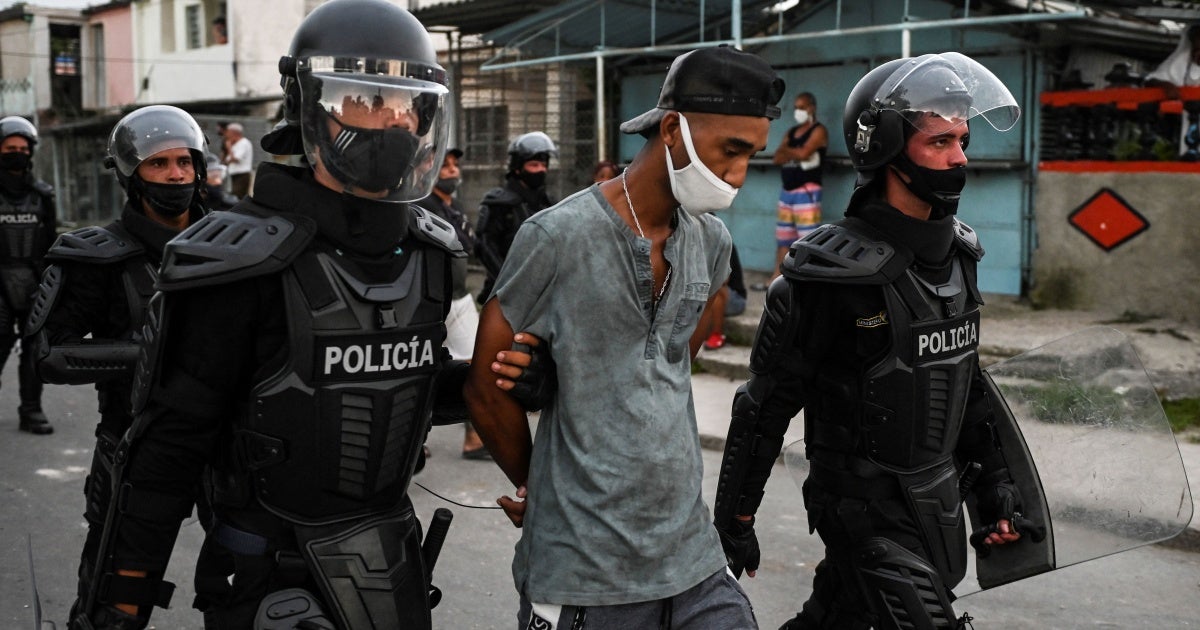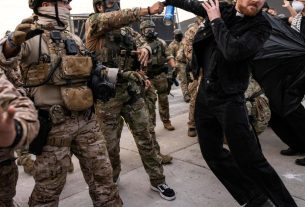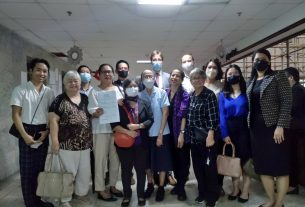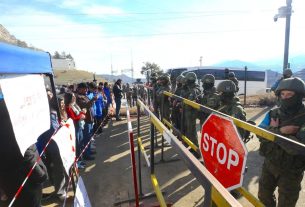- Protesters detained for participating in the peaceful July 2021 protests in Cuba have been subject to serious abuses in prison, including beatings, solitary confinement, and lack of medical care.
- While some were released, they say they remain under constant surveillance. Hundreds are still in prison. The living conditions they were protesting have not improved.
- Governments should condemn the arbitrary detention and harassment of protesters, raise concerns about the grave humanitarian situation in the country, and support independent rights groups and journalists in Cuba.
(New York) – Protesters detained for participating in the peaceful July 2021 protests in Cuba have been subject to serious abuses in prison, Human Rights Watch said today. Despite a January 2025 deal that led to the release of some of these prisoners, hundreds remain in detention.
Former detainees who were released following Vatican-led negotiations in January told Human Rights Watch that they were beaten and held in solitary confinement as punishment. They described unhealthy and unhygienic prison conditions, including woefully inadequate food and water. They said that they remain under constant surveillance and strict conditions, some of which appear to have been imposed informally. Many fear being sent back to prison, and at least three of the people released have been rearrested.
“Four years ago, the Cuban government unleashed repression on thousands of Cubans who peacefully took to the streets demanding rights and freedoms,” said Juanita Goebertus, Americas director at Human Rights Watch. “Today, hundreds remain behind bars in dismal conditions.”
Between March and May 2025, Human Rights Watch interviewed 17 former detainees by phone. These included people who were held in six prisons for men – Alto Río de Guanajay, Boniato, Cerámica Roja, Mar Verde, Valle Grande, and Unidad 1580 – and the Guamajal and Matanzas prisons for women. Several said they had been moved to prison camps or lower security facilities during their detention. Independent human rights organizations Cubalex, Justicia 11J, and Prisoners Defenders facilitated contact with some of the interviewees. Due to the risk of retaliation, Human Rights Watch has not disclosed the identities of most of those interviewed.
Numerous former detainees described physical abuse by prison guards. They said that guards beat them for shouting anti-government slogans or protesting about prison conditions. Many said they were subjected to stress positions such as “the bicycle” (also known as the “wheelbarrow”), in which prisoners are forced to run, handcuffed, with their arms raised above their heads.
Former detainees consistently described overcrowded cells and poor access to food and clean water for both political and ordinary prisoners. “If your family isn’t bringing you food, you die,” one former prisoner said. “The food they gave you was inedible. It had worms in it,” said another.
The former detainees described outbreaks of scabies, tuberculosis, dengue fever, and Covid-19, which they said were left untreated. They said prison officials regularly ignored medical concerns, and in many cases, punished detainees for raising concerns about unsanitary conditions or food shortages. Those who protested said they were frequently sent to solitary confinement, or denied visits, calls, or access to packages sent by their family members.
In January 2025, Cuban authorities announced the release of 553 prisoners following negotiations between the Cuban government, the Vatican, and the United States. Independent Cuban rights groups, including Cubalex, Justicia 11J, and Prisoners Defenders, estimate that about 200 of those released were political prisoners, and that the rest were ordinary prisoners.
On the day that the Cuban government announced the prisoners’ release, the Biden administration removed Cuba from the US list of countries that support terrorism, a designation that restricts US aid and trade. On his first day in office, President Donald Trump put Cuba back on the list.
Many of the protesters who were released said they are required to accept state-assigned jobs, report regularly to security agents, and request permission to leave their municipalities. Several also said they are barred from participating in public demonstrations, associating with opposition groups, and posting on social media. At least in some cases, such conditions appear to have been imposed informally and arbitrarily, as they are not included in a written order or court-ordered conditions of release.
Members of the intelligence services, known as “state security,” have followed those released on the streets and gone to their homes, former detainees said, to threaten and monitor them, and deliver written or verbal summons to appear in court or at the police station. “Although I was released from prison, I am still a prisoner,” one of them said. “It’s like being a prisoner in the street.”
In April, authorities rearrested José Daniel Ferrer, leader of the Cuban Patriotic Union (UNPACU) opposition movement, and Félix Navarro, founder of the Pedro Luis Boitel Party for Democracy, who had been released in January. In May, the authorities rearrested Donaida Pérez Paseiro, president of the Free Yoruba Association of Cuba, after she campaigned for her husband’s release on social media. Her husband remains imprisoned in connection with the 2021 protests.
Cubans continue to endure a severe economic crisis and face acute shortages of food and medicine, an important factor that brought Cubans to the streets in July 2021. A 2024 survey of over 1,100 people by the Cuban Observatory of Human Rights found that 7 in 10 Cubans skip a meal every day, and 61 percent struggle to afford basic necessities. People across the country also face daily power outages ranging from 4 to 20 hours.
As a result of poverty and political repression, Cubans have left the country in vast numbers. Ten percent of Cuba’s population – over a million people – left the island between 2022 and 2023, according to the head of the country’s national statistics office. Independent reports indicate the total figure may be much higher.
Governments in Latin America, Canada, and the European Union should condemn the Cuban government’s arbitrary detention and harassment of protesters, journalists, and activists and raise concerns about human rights abuses and the grave humanitarian situation in the country, Human Rights Watch said. Governments should also increase support for independent human rights groups and journalists in Cuba.
For more details and accounts from victims please see below.
Human Rights Watch documented a range of abuses against protesters and critics detained in connection with the July 11, 2021 protests, including beatings, solitary confinement, and poor prison conditions. These findings build on Human Rights Watch’s prior reporting on abuses against people who participated in the July 2021 protests, including due process violations, arbitrary detention and mistreatment.
Abuses and Poor Conditions in Prison
Beatings and Stress Positions
Numerous former detainees said that guards beat and otherwise abused them if they shouted anti-government slogans or complained about the prison conditions. They said guards also beat people detained for ordinary crimes.
Ferrer, the leader of the UNPACU opposition movement, said that in November 2024 guards tried to take him to the Boniato prison hospital for an arm injury. When he refused to go because he heard there was an ongoing tuberculosis outbreak there, he said, the guards punched him in the head and in his injured arm. “I was bleeding all day, from the wound,” he said. Ferrer said that they forced him to do the “bicycle,” then forced him into a car and took him to the Boniato prison hospital.
He also described an incident in December 2022, in which seven guards beat him for shouting “down with [Miguel Díaz] Canel [the Cuban president], down with the tyranny” during a family visit. He said they forced him to do the ‘bicycle.’ Later, they took him to a cell, where he said they hit him in the ribs. “I was lying on the floor, [a prison official] kicked me and fractured my nasal septum, blood was coming out of my nose.”
Five former detainees held in Guanajay prison said that between 30 and 40 guards violently repressed a hunger strike by 15 to 20 prisoners in November 2021. The former detainees said that, after they refused breakfast and lunch, prison guards entered their cells and shackled their hands and feet, threw them around different cells, beat them with batons, and dragged them through the prison.
One of them said that he was thrown down the stairs and taken to another area of the prison, where he was beaten again. He said he was later thrown into a truck with other prisoners, where guards continued to beat two of them. He added that guards later took him to the infirmary with a bleeding head wound. A medical professional warned him to stop the hunger strike to avoid further beatings, he said. Another former detainee said that guards brought dogs to his cell to intimidate him into abandoning the hunger strike.
A former detainee who said he was beaten that day said:
“I have indelible marks on my body…. My right ankle is swollen because of all the bruises they gave me…. I still have baton marks on my thighs, I don’t know what they did to me. I couldn’t move…. After they sent me back to my cell, a cellmate had to help me get out of bed because I couldn’t move by myself.”
The five former detainees described injuries to other protesters because of the beatings, including an older man whose hip, they said, was dislocated.
Solitary Confinement
Many former detainees described extended periods of solitary confinement, ranging from one day to nine months, in what they referred to as “punishment cells.” They said guards would send them to these cells when they complained about prison conditions or to prevent organized protests and hunger strikes. Ferrer said that he spent three years and four months consecutively in solitary confinement. Another former detainee held in Guanajay said that his multiple stays in solitary confinement added up to a year and four months.
A former prisoner detained at Guanajay said:
“For any stupid thing they would send you [to the punishment cell] for 15 days.… The cells were small, with the doors boarded up…. There is no ventilation in the front, it’s an iron door. They are dark…. You have to ask for water.”
A former detainee held in the same prison described beatings in these cells:
“Most of us were beaten. Every time you had any problem, or you complained or something, [guards] sent you to the punishment cell, they dragged you there and beat you up.”
A former detainee held in Boniato said he was beaten and put in solitary confinement several times for making requests to guards. In one incident, in 2022, he said:
“They brought me down in handcuffs using a hold they call ‘the bicycle,’ and they beat me with a hose all over my body. After, when I was in the solitary confinement cell, I was also threatened and slapped in the face by [a] guard.”
A former detainee described a case in the Matanzas women’s prison in which a woman was sent to a “punishment cell” for injuring herself. She said: “When the woman would cut herself, instead of giving her care, they would put her in the [solitary confinement] cell.”
Poor Access to Food and Water, and Sleep Deprivation
Former detainees described woefully inadequate or inedible meals in prison. Several said the food had worms in it and was sometimes spoiled.
Most former detainees described receiving a small piece of bread with tea or another beverage in the morning, and croquettes with a small amount of rice, and sometimes a small piece of meat, for lunch and dinner. One said that when there was no bread left, they would receive two spoonfuls of flour for breakfast. Former detainees said they relied on food packages brought by their relatives. “Many prisoners who have no family live lying in bed, because they would faint from hunger,” one former detainee said.
Former detainees said that access to water was limited and the water available was often visibly dirty, cloudy, foul-smelling, or containing flies or worms. Several former detainees said they relied on bottled drinking water provided by their families. Ferrer said:
“I only had two liters of water a day for all my needs. The water had sediment in it, mosquito larvae were hatching. I would leave the water for a while to see the sediment and check the smell it had. They would bring me water according to the intensity of my protest.”
A former detainee held in the Matanzas women’s prison said:
“[You would wash] only once a day, they gave you only a bucket of water, if they did at all. I can’t describe the water as drinkable. When you finished bathing, the bucket had dirt at the bottom. It was the same water for drinking. Almost every woman had moniliasis [yeast infection] because the water is terrible for washing yourself.”
In many detention facilities, several former detainees said that guards never turn off the lights, preventing them from sleeping. A former detainee held in Guanajay said:
“The lights never go out. The prisoners sleep with the lights on. I had a white LED lamp above my eyes…. And the walls were painted white. It consumed you.”
Another former detainee held in the same prison said that if the prisoners tried to cover the light with a piece of cloth, the guards would force them to take it off.
Unsanitary Conditions, Disease Outbreaks, Lack of Medical Attention
Former detainees described outbreaks of dengue, Covid-19, tuberculosis, chickenpox and scabies, and some described suffering from diarrhea or amoebic dysentery, which they believed were linked to the contaminated water and overcrowded conditions.
A former detainee who was held in Guanajay said:
“There were always outbreaks. The place was full of mosquitoes and bedbugs. If there was heavy rain, the water system backed up, and everyone felt sick to their stomach. They expected us to clean the cells but didn’t give us anything to clean them with.”
A former detainee held in Matanzas women’s prison said:
“You can’t sleep at night because of the bedbugs. The lockers are full of cockroaches.… There weren’t enough doctors. In fact, the nurse was the one who had to do all the work. If you had your own medicine, the nurse would administer it. But otherwise, since there was no doctor to take care of you, they didn’t take care of you and that was it.”
Several former detainees also said that their medical needs were routinely ignored and that there was no medication to help treat them. A former detainee held in Mar Verde said:
“There is no medical assistance because there is no medicine. There was one bathroom to wash and go to the bathroom, for 50 to 60 prisoners. There was no water to wash the toilets, and you couldn’t flush them.”
A former detainee held in Guanajay said:
“There’s nothing inside, no medicine at all. The few medications that come in disappear quickly. I assume the doctors or prison chiefs take it to sell it. If you have a headache, they say: “Lie down, put in some earplugs, and try to forget you have a headache.” That’s the kind of thing the medical staff would tell you.”
Surveillance, Strict Conditions Following Prison Release
As a result of a negotiation with the Vatican and the Biden administration, Cuba announced in January that it would “release” 553 people who had been convicted of “several crimes.” According to groups monitoring human rights in Cuba, about 200 of the detainees that authorities freed were political prisoners, and the rest were ordinary criminals.
All 17 former political prisoners interviewed said that they were released under strict conditions, which included several or all of the following: a ban on associating with opposition groups, appearing at public gatherings or crowded places, going out at night, criticizing the government, and leaving their municipality without municipal court permission. Many are required to report regularly at a court or police station. Most also said they were required to take on state-assigned jobs, for instance, in maintenance or cleaning.
Several former detainees said that court authorities communicated these conditions verbally but did not convey them in writing. Four parole documents reviewed by Human Rights Watch do not include these conditions.
Several also said that officials wearing civilian clothes come to their homes periodically and follow them on the streets. “They don’t identify as [state security agents], but I know it’s them,” one former detainee said. “They come [over] to me, and they tell me, ‘Hey, don’t do it again, look what happened to you.’”
One of the former detainees described the surveillance he faces in San Antonio de los Baños since his release:
“When I’m sitting in the doorway, for example, in my non-working hours, [the man] walks by and takes pictures of me. It’s the same person who I’ve been told has been taking photos around my house and he passes by a lot.”
Protesters, Critics Behind Bars
At least three of the political prisoners released in January have since been rearrested, allegedly for violating the terms of their release, and remain behind bars:
- On April 29, state security agents rearrested Ferrer, the UNPACU leader. The Supreme Court said that he failed to attend two mandatory judicial hearings. The court also mentioned his activism and contact with foreign diplomats, though it claims these were not relevant to its ruling that he should be detained. In 2020, the United Nations Working Group on Arbitrary Detention found his detention at the time to be arbitrary and called on Cuba to release him.
- The same day, state security agents rearrested Navarro, founder of the Pedro Luis Boitel Party for Democracy. The Supreme Court said that he left Matanzas province several times without permission. Navarro had been sentenced to nine years for “public disorder,” “assault,” and “contempt” in connection with his participation in the 2021 protests.
- In June, state security agents rearrested Pérez Paseiro, president of the Free Yoruba Association of Cuba. Villa Clara’s provincial court published a social media post indicating that her release had been revoked because she did not attend court hearings. Pérez Paseiro had been sentenced to eight years for “public disorder,” “assault,” and “contempt” in connection with her participation in the 2021 protests. After her release in January, she had used social media to call for the release of her husband, who was also detained in connection with the protests.
According to the rights group Prisoners Defenders, 420 people detained in connection with the July 2021 protests remain behind bars, and 751 are still serving sentences of some kind. Human Rights Watch has documented that many were subject to proceedings that violated due process guarantees and convicted for overly broad crimes, such as “sedition” and “public disorder,” and that some were sentenced to disproportionate prison terms. Those still in jail in connection with the July 2021 protests include:
- Luis Manuel Otero Alcántara, an artist who was arrested after posting a video saying he would join the July 2021 protests. He was sentenced to five years in prison, for “insulting national symbols,” among other crimes. He is being held at the Guanajay maximum-security prison.
- Ibrahím Domínguez Aguilar, a rapper who was arrested in July 2021 after calling on people to protest against the government. He was sentenced to 10 years in prison for charges of “assault” and “public disorder.” He is currently being held at the Boniato maximum-security prison in Santiago de Cuba. His family and Prisoners Defenders have reported that he has been severely beaten.



